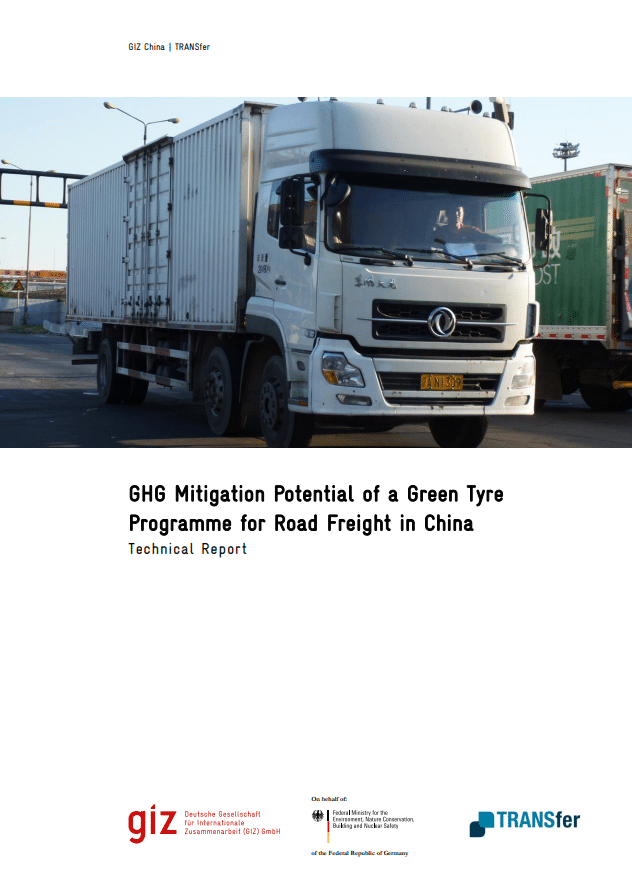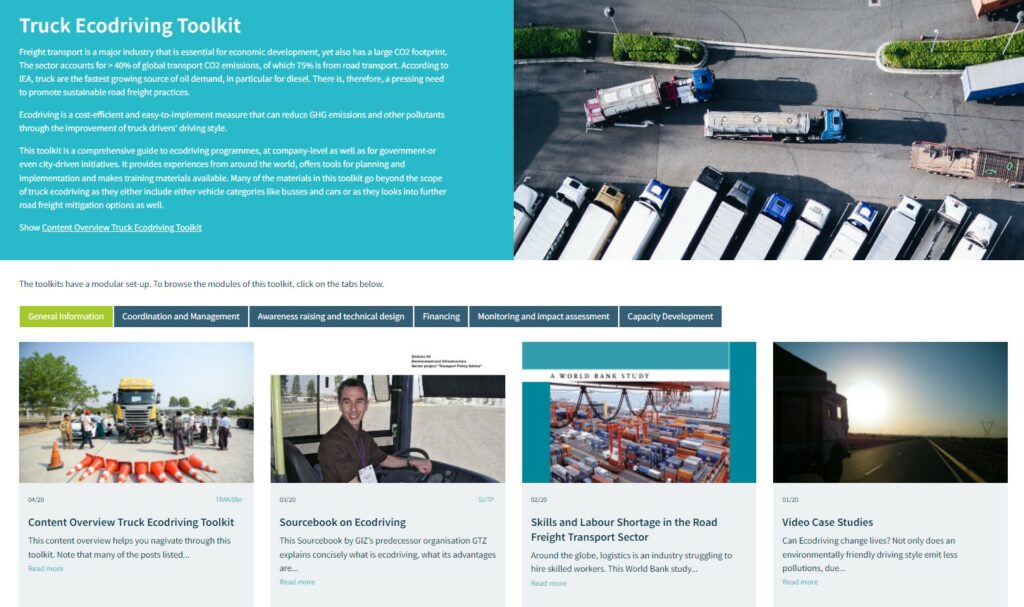
In this edition of our ‘stories of change’ series, we feature activities, results and lessons learned from the GIZ TRANSfer project in Peru, China and Indonesia to show how international cooperation can support the net-zero transition in freight transport. The TRANSfer project is one of the few international cooperation projects that started to deal with freight a couple of years ago. It is funded by the International Climate Initiative of the Federal Ministry for Economic Affairs and Climate Action.
Why is a focus on freight transport vital?
Recently, the Council for Decarbonising Transport in Asia ranked freight as the #1 blind spot in their “The Path to Zero” report, while freight is responsible for almost half of transport-related carbon emissions on the continent. And freight hardly shows up in the NDCs, the national climate plans submitted by the countries.
The lack of attention is one of several factors that puts freight transport into the group of ‘hard-to-abate sectors’ where the routes to net-zero are fuzzy and complicated. Freight vehicles make up 42% of global transport CO2 emissions, and their footprint will continue growing under current policies (by 22% until 2050, according to the ITF). In addition, trucks contribute disproportionately to air pollution relative to their global numbers.
While each country’s freight system is specific, we find similar patterns in developed and developing countries: Freight transport is an extremely diverse and fragmented industry. Domestic markets consist of a small circle of big players and thousands of small enterprises that require support for a just transition. Modal fragmentation as well as a lack of data are widespread phenomena.

As freight transport is a predominantly business-oriented activity that is linked to geopolitical issues like trade, commodities and supply chains, its political economy, its drivers and its trends are in many ways different from passenger transport. The profit margins of freight operators are often so thin that investments in new, cleaner technology remain out of reach without supportive policies.
For example, Chinese authorities and TRANSfer worked together on understanding and promoting the fuel-saving potential of truck tyres with low rolling resistance. At the time in 2016, however, we found that it can be difficult to convince companies to invest in such more expensive tyres. To overcome this barrier and to strengthen trust in the savings potential, further standards and regulations for tyre classification and labelling have been recommended. In addition, the analyses of the CO2 benefits of green tyres provided transparency on the contribution that their widespread adoption could yield for China’s climate targets: a reduction of 12-68 MtCO2 per year is possible even under the most conservative scenario.
Starting up green freight – how technical advice delivers change
No matter how important and how sidelined the issue of green freight may seem, we must focus on the issues that really matter to the people and institutions in the partner countries. This is always an imperative for development cooperation.
The main local development concerns in the freight & logistics sector are economic and social: to reduce the domestic costs of logistics and boost competitiveness with more efficient logistics; to facilitate trade through the development of well-connected logistic infrastructures for multiple transport modes; to improve traffic, road safety and local pollution with vehicle regulations; or, to address the skills gap for a modern, efficient logistics system. Any initiative towards green freight needs to deliver clear ‘wins’ for these local concerns.

In Indonesia’s cooperation with TRANSfer, the modernisation of truck fleets emerged as a concern for the Ministry of Transportation. The Ministry chose this area of cooperation due to its linkages with its priority agenda of banning ‘ODOL’ (Overdimensioning and overloading of trucks) by 2023 to improve safety on Indonesian highways and toll roads. The hypothesis has been that the government’s push for a stricter enforcement of truck loading regulations could accelerate the replacement rate of truck fleets. With the right policies and incentives in place, this creates a window of opportunity to deploy a more environment friendly vehicle fleet.
Another area of cooperation in Indonesia has been the shift of freight flows on Java from road to rail. The topic aligns well with the government’s targets for strengthening the modal share of rail, with its logistic cost reduction agenda and with its planned investments in rail connections for several ports in the country. A technical study by TRANSfer identified a long list of potential policies and investments with which Indonesia could overcome the many barriers that prohibit rail freight from gaining significance. Several recommendations have already been implemented (e.g. a simplified registration process for multimodal transport operators) or have been included in official plans (e.g. freight mode shift is an action item in the NDC roadmap).
In Peru, the Ministry of Transportation and TRANSfer joined forces to tackle the skills gap of truck drivers on safe and fuel-efficient driving techniques. The obvious answer has been driver training, for which manuals and evaluation tools have been developed and tested with truck drivers. A national ecodriving program could generate 4 MtC02e of GHG emissions savings by 2030. Thus, ecodriving has been included in Peru’s transport NDC as a mitigation measure.
As driving performance and better freight vehicles are inextricably linked components of efficient road transport services, another key result of TRANSfer’s cooperation in Peru has been a scrappage programme for old, heavily polluting trucks. Around 16.8 million euros in public spending have been approved in 2020 to start the scrappage program.
Recognising that professional capacity of drivers is one of the key factors for fuel efficiency and safety, truck ecodriving is also the focus of one of our six climate action toolkits.

Nothing works without effective stakeholder dialogues
GIZ builds relationships with the communities and representative groups who have a stake in the local freight system. We continuously engage government, industry, local authorities and wider stakeholders in conversations about the scope of a more coordinated approach towards green freight action and how it could be delivered in practice. Without stakeholder support, no implementation.
The freight transport sector is often a somewhat ‘homeless’ issue as it lacks clear governmental ownership and coordination among parts of the government. In Peru, TRANSfer therefore acted as a faciltiator between government departments to enable a joint agenda. As part of the ecodriving and scrappage programme, the Ministry of Transport and Communication is collaborating with the Ministries for Environment, for Energy and for Finance.

Private sector engagement has special importance because the freight sector is predominantly a corporate world. To identify barriers and solutions, our team in Indonesia ran comprehensive surveys, multiple meetings and a series of workshops with industry associations, companies and state-owned enterprises. Aside from gathering information, these dialogues have been essential for establishing trustful relationships among public and private stakeholders, for addressing concerns and for ensuring a transparent process.
What comes next?
The latest IPCC report (AR6 WG III) acknowledges that systemic transformations in the freight sector are needed to limit global heating. These transformations require public-private dialogue, positive stakeholder relations, agents of change and strong political will that holds against opposition and that is sensitive to the livelihoods of the sector’s workforce. The opportunities are plenty, but so are the barriers.
The international discourse on the decarbonisation of freight and logistics advances at a good pace. There are a growing number of events, knowledge products, governmental strategies, corporate climate targets, as well as new opportunities of vehicle electrification and PtX. The corona crises may have catalysed this trend.
International cooperation has a vital role to play in making green freight a global agenda and in turning it from opportunity to activity. While TRANSfer ends in 2022, other IKI- and BMZ-funded GIZ projects continue to tackle local barriers and to make change work in the freight and logistics sector, e.g. in India or in Mexico. As Germany is a global logistics champion, its practices, policies and innovations are very much in demand our partner countries. In the years to come, there is a good chance for enhancing international cooperation on freight.
If you believe that you suffer (potential) negative social and/or environmental consequences from IKI projects, or wish to report the improper use of funds, to voice complaints and seek redress, you can do so using the IKI Independent Complaint Mechanism.
You are currently viewing a placeholder content from X. To access the actual content, click the button below. Please note that doing so will share data with third-party providers.
More Information